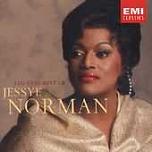Jessye Norman’s army of fans won’t hesitate to snap up this two-disc “Very Best Of …” set, especially since it mines a rich vein of material from 1970 to the mid-1980s, when her remarkable voice was at its freshest. Norman never produces anything less than a big, luscious, mezzo-ish sound, and she excels in a wide range of repertoire, of which this collection barely skims the surface. The first disc is all meat and potatoes, a hefty dose of Wagner followed by three masterfully sung Schubert songs and “Ihr habt nun Traurigkeit” from Brahms’ German Requiem, sung movingly with a richer voice and closer focus than we usually get. The Wagner arias include a commanding “Dich teure Halle”, a rapt version of Elizabeth’s Prayer from Tannhäuser, Senta’s Ballad from The Flying Dutchman (in which she’s imperious and inward, with some ravishing pianissimos in the latter mode), and a fine “Mild und leise” from Tristan, all knowingly led by Klaus Tennstedt. In the Wesendonck Lieder, neatly accompanied by Irwin Gage, Norman scales her voice to suit the more intimate songs but releases huge torrents of sound when the music calls for it.
The French repertoire on Disc 2 begins and ends with Offenbach–selections from her complete recordings of Tales of Hoffmann from the Cambreling-led super-complete version, and La Belle Hélène with Plasson at the helm. In the latter she gets a chance to show her too-rarely heard sense of humor. In Hoffmann, there’s a somewhat fussy Barcarolle duet and snippets from Giulietta’s other scenes sung with flair for the style. Sandwiched between the Offenbachs we get a ravishing “Premiers transports” from Berlioz’s Roméo et Juliette, and a Ravel set that includes her fabulous Chanson madécasses, complete with a chilling version of “Aoua! Aoua!” and a sinuous, sensuous “Il est doux de sa coucher” marred only the engineers’ backward placement of the excellent accompanying trio. Also not to be overlooked is Norman’s Poulenc set, made long before the onset of prima donna-hood, featuring an idiomatic “Tu vois le feu du soir” and delectable performances of the miniature gems of La Fraicheur et le feu. She sings the title song in a true contralto, one of many reminders of her extraordinary vocal range. Unless you already have these items, this collection is not to be missed.
































